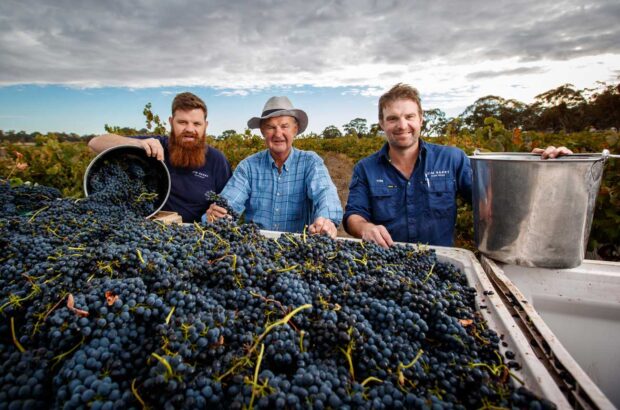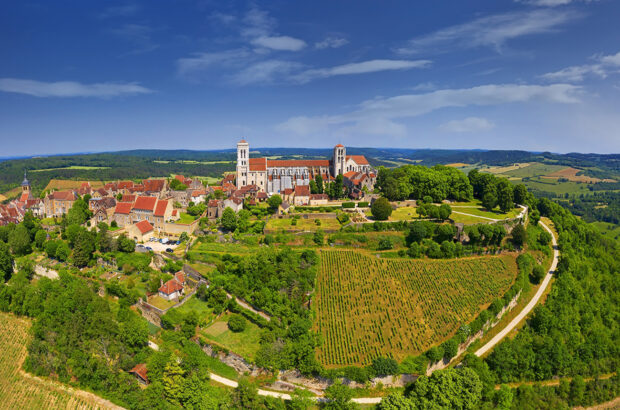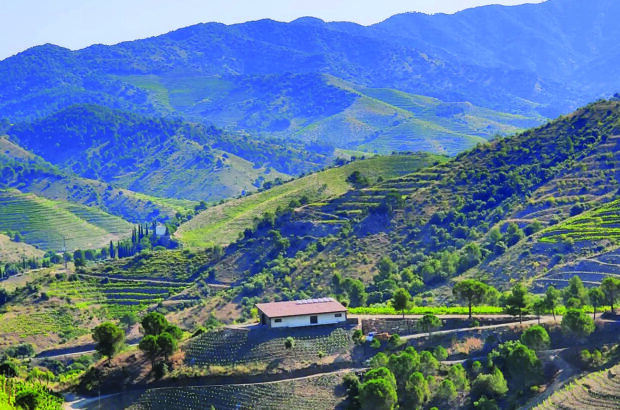100% Fromenteau is not the answer you’d expect when enquiring about a Champagne blend. But ‘Trop m’en faut!’ isn’t a run-of-the-mill Champagne, a fact hinted at by the quirky name, a Rabelaisian phrase that translates as: ‘It is so good that one cannot have too much of it!’.
See the tasting note and score for Drappier ‘Trop m’en faut!’
Rare variety
More commonly known as Pinot Gris, the Fromenteau grape variety makes up just 0.3% of the Champagne AP area, along with other lesser known varieties Petit Meslier, Arbane and Blanc Vrai – but account for 6% of Drappier’s plantings.
{"content":"PHA+VGhlIGJyYWluY2hpbGQgb2YgSHVnbyBEcmFwcGllciwgdGhlIGlkZWEgd2l0aCB0aGlzIG5ldyBjdXbDqWUgaXMgdG8gcHJvdmlkZSBhIHJpY2ggZXhwcmVzc2lvbiBvZiB0aGUgRHJhcHBpZXIgdGVycm9pciwgdGhyb3VnaCBhIHdpbmUgcHJvZHVjZWQgdXNpbmcgdHJhZGl0aW9uYWwgQ2hhbXBhZ25lIG1ldGhvZHMsIHdoaWNoIGF0IHRoZSBzYW1lIHRpbWUgaXMgcGFydCBvZiBhIG5ldyBnZW5lcmF0aW9uIG9mIGF1dGhlbnRpYywgbmF0dXJhbCBDaGFtcGFnbmUuPC9wPgo8cD5UaGUgRHJhcHBpZXIgZmFtaWx5IGhhcyBiZWVuIGJhc2VkIHNpbmNlIDE4MDggaW4gdGhlIHZpbGxhZ2Ugb2YgVXJ2aWxsZSwgc2l0dWF0ZWQgaW4gdGhlIHNvdXRoZXJuIHBhcnQgb2YgdGhlIENoYW1wYWduZSByZWdpb24ga25vd24gYXMgdGhlIEPDtHRlIGRlcyBCYXIuIE1pY2hlbCBEcmFwcGllciBhbmQgaGlzIGNoaWxkcmVuIENoYXJsaW5lIGFuZCBIdWdvIGFsbCBiZWxpZXZlIGluIHNwcmVhZGluZyB0aGUgd29yZCBhYm91dCB0aGUgYW5jaWVudCBncmFwZSB2YXJpZXRpZXMgb2YgdGhlIENoYW1wYWduZSByZWdpb24gdGhhdCBzdGlsbCBleGlzdCBhbG9uZ3NpZGUgdGhlIGNsYXNzaWMgdHJpbyBvZiA8YSBocmVmPSJodHRwczovL3d3dy5kZWNhbnRlci5jb20vd2luZS9ncmFwZS12YXJpZXRpZXMvY2hhcmRvbm5heS8iPjxzdHJvbmc+Q2hhcmRvbm5heTwvc3Ryb25nPjwvYT4sIDxhIGhyZWY9Imh0dHBzOi8vd3d3LmRlY2FudGVyLmNvbS93aW5lL2dyYXBlLXZhcmlldGllcy9waW5vdC1ub2lyLyI+PHN0cm9uZz5QaW5vdCBOb2lyPC9zdHJvbmc+PC9hPiwgYW5kIFBpbm90IE1ldW5pZXIuPC9wPgo8aDM+QmxlbmQgb2YgdHdvIHZpbnRhZ2VzPC9oMz4KPHA+4oCYVHJvcCBN4oCZZW4gRmF1dCHigJkgaXMgYSBibGVuZCBvZiB0d28gdmludGFnZXMsIDIwMTcgYW5kIDIwMTgsIGluIGVxdWFsIHByb3BvcnRpb25zLCBhbmQgb25seSA1LDUwMCBib3R0bGVzIHdlcmUgcHJvZHVjZWQuPC9wPgo8cD48ZGl2IGNsYXNzPSJhZC1jb250YWluZXIgYWQtY29udGFpbmVyLS1tb2JpbGUiPjxkaXYgaWQ9InBvc3QtaW5saW5lLTIiIGNsYXNzPSJpcGMtYWR2ZXJ0Ij48L2Rpdj48L2Rpdj48L3A+CjxwPkl0IHdhcyBtYWRlIGFzIG5hdHVyYWxseSBhcyBwb3NzaWJsZS4gVGhlIGJhc2Ugd2luZSB1bmRlcndlbnQgbWFsb2xhY3RpYyBmZXJtZW50YXRpb24sIGJ1dCBubyBlbnp5bWVzIHdlcmUgYWRkZWQuIEhhbGYgb2YgaXQgd2FzIGFnZWQgaW4gb25jZS11c2VkIGJhcnJlbHMgd2hpbGUgdGhlIG90aGVyIGhhbGYgd2VudCBpbnRvIGxhcmdlciBjYXNrcyBjYWxsZWQgZGVtaS1tdWlkcyB0aGF0IGhhZCBhbHJlYWR5IGJlZW4gdXNlZCBmb3IgdGhyZWUgcHJldmlvdXMgdmludGFnZXMuIFRoZSBvYWsgaXMgc291cmNlZCBmcm9tIGEgcmVnaW9uYWwgd29vZGVkIGFyZWEga25vd24gYXMgdGhlIEZvcsOqdCBkdSBUZW1wbGUgaW4gdGhlIHNlY3RvciBvZiBBdWJlLjwvcD4KPHA+VGhlcmUgaXMgc2NhbnQgdXNlIG9mIHN1bHBodXIgZm9yIHRoaXMgY3V2w6llIGFuZCBubyBkb3NhZ2UgYXQgYWxsLjwvcD4KPGgzPkNoYWJsaXMtbGlrZSBzb2lsczwvaDM+CjxwPlRoZSBDaGFtcGFnbmUgaXMgcHJvZHVjZWQgd2l0aCBncmFwZXMgZnJvbSBhIHNtYWxsIERyYXBwaWVyIHBhcmNlbCBuYW1lZCBUcnVjaG90cywgdGhlIHZpbmVzIHBsYW50ZWQgb24gcHJpbWUgS2ltbWVyaWRnaWFuIGxpbWVzdG9uZSBzb2lscywgd2hpY2ggYXJlLCBhcyBIdWdvIERyYXBwaWVyIGxpa2VzIHRvIHBvaW50IG91dCwgc2ltaWxhciB0byB0aGUgc29pbHMgZm91bmQgaW4gdGhlIGdyYW5kIGNydSBzZWN0b3Igb2YgQ2hhYmxpcy48L3A+CjxkaXYgY2xhc3M9ImFkLWNvbnRhaW5lciBhZC1jb250YWluZXItLW1vYmlsZSI+PGRpdiBpZD0icG9zdC1pbmxpbmUtMyIgY2xhc3M9ImlwYy1hZHZlcnQiPjwvZGl2PjwvZGl2Pgo8cD5JdCBpcyBhIHN1bm55LCBzb3V0aHdlc3QtZmFjaW5nIHNpdGUgbHlpbmcgYXQgYW4gYWx0aXR1ZGUgb2YgMjgwIG1ldHJlcyDigJMg4oCYcXVpdGUgaGlnaCBmb3IgdGhlIENoYW1wYWduZSByZWdpb24s4oCZIGFjY29yZGluZyB0byBEcmFwcGllci48L3A+CjxwPkZhcm1pbmcgaXMgb3JnYW5pYyBhbmQgaG9yc2VzIGFyZSB1c2VkIHRvIHdvcmsgdGhlIGxhbmQuIE9ubHkgb25lIGdyYXBlIHZhcmlldHkgaXMgcGxhbnRlZCBvbiB0aGlzIHBsb3QsIHRoZSBhZm9yZW1lbnRpb25lZCBGcm9tZW50ZWF1LCBidXQgdGhlIENoYW1wYWduZSBhcHBlbGxhdGlvbiBydWxlcyBkbyBub3QgYWxsb3cgYW55IG1lbnRpb24gb2YgaXQgb24gdGhlIGxhYmVsLjwvcD4KPGRpdiBjbGFzcz0iYWQtY29udGFpbmVyIGFkLWNvbnRhaW5lci0tbW9iaWxlIj48ZGl2IGlkPSJwb3N0LWlubGluZS00IiBjbGFzcz0iaXBjLWFkdmVydCI+PC9kaXY+PC9kaXY+CjxoMz5DcmVhdGl2ZSB0aGlua2luZzwvaDM+CjxwPlRvIGdldCBhcm91bmQgdGhhdCByZXN0cmljdGlvbiwgRHJhcHBpZXIgY3JlYXRpdmVseSBwdWxsZWQgb3V0IG9mIGhpcyBoYXQgdGhlIHJoZXRvcmljYWwgZGV2aWNlIGtub3duIGFzIHBhcm9ub21hc2lhIHRvIHBsYXkgb24gdGhlIHBob25pYyBzaW1pbGFyaXRpZXMgYmV0d2VlbiB0aGUgbmFtZSBvZiB0aGUgZ3JhcGUgYW5kIGEgY2F0Y2hwaHJhc2Ugb3JpZ2luYXRpbmcgZnJvbSBhIHRleHQgaW4gb2xkIEZyZW5jaCBieSBSYWJlbGFpcyB0byBkZXNpZ25hdGUgaGlzIENoYW1wYWduZSB0aGF0IGFzcGlyZXMgdG8gYmUg4oCYdG9vIGdvb2QgdG8gYmUgdHJ1ZeKAmS48L3A+CjxkaXYgY2xhc3M9ImFkLWNvbnRhaW5lciBhZC1jb250YWluZXItLW1vYmlsZSI+PGRpdiBpZD0icG9zdC1pbmxpbmUtNSIgY2xhc3M9ImlwYy1hZHZlcnQiPjwvZGl2PjwvZGl2Pgo8cD5BcyBmb3IgdGhlIHNwZWNpZmljIG5vbWVuY2xhdHVyZSBvZiB0aGUgZ3JhcGUgaXRzZWxmLCDigJhJIGluc2lzdCBvbiB1c2luZyBGcm9tZW50ZWF1IGFuZCBub3QgUGlub3QgR3JpcywgYmVjYXVzZSBpdCBpcyBpbiBmYWN0IGEgY291c2luIG9mIFBpbm90IEdyaXMgc291cmNlZCBmcm9tIGdyYWZ0cyBmb3VuZCBpbiB0aGUgQ2hhbXBhZ25lIHJlZ2lvbizigJkgZXhwbGFpbnMgRHJhcHBpZXIuPC9wPgo8ZGl2IGNsYXNzPSJpbmplY3Rpb24iPjwvZGl2Pgo8cD5SZWNlbnQgRE5BIGFuYWx5c2lzIGhhcyBzaG93biwgaG93ZXZlciwgdGhhdCB0aGV5IGFyZSBpbiBmYWN0IG9uZSBhbmQgdGhlIHNhbWUuIFRoZSB3aW5lcyBtYWRlIGZyb20gZWl0aGVyIGdyYXBlIHZhcmlldHkgY2VydGFpbmx5IHNoYXJlIGNoYXJhY3RlcmlzdGljcywgYW1vbmcgd2hpY2ggRHJhcHBpZXIgZW1waGFzaXNlcyDigJh0aGUgcGluayBodWUgb2YgdGhlIG11c3QgYXMgd2VsbCBhcyBub3RlcyBvZiBNaXJhYmVsbGUgcGx1bXMgYW5kIGV2ZW4gZXhvdGljIGZydWl0cyBpbiB0aGUgd2luZeKAmS4gSGUgYWxzbyBhbGx1ZGVzIHRvIHRoZSBsb3cgYWNpZGl0eSBhbmQgaGlnaCBhbGNvaG9sLjwvcD4KPHA+VHJvcCBN4oCZZW4gRmF1dCHigJkgaXMgYW4gdW51c3VhbCBhbmQgYXR0ZW50aW9uLWdyYWJiaW5nIGN1dsOpZSwgd2l0aCBub3RlcyBvZiBleG90aWMgZnJ1aXQgc3VjaCBhcyBndWF2YSwgYW5kIGEgdGFubmljIHNlbnNhdGlvbiB0aGF0IHByb3ZpZGVzIHN0cnVjdHVyZSB0byBhIGxvbmcgYnV0IG9oIHNvIGVsZWdhbnQgZmluaXNoLjwvcD4KPHA+PGVtPlRoZSB3aW5lIGlzIGRpc3RyaWJ1dGVkIGluIHRoZSBVSyBieSBCZXJrbWFubiBXaW5lIENlbGxhcnMuPC9lbT48L3A+CjxwPgo="}
See the tasting note and score for Drappier ‘Trop m’en faut!’
{}
{"wineId":"53265","displayCase":"standard","paywall":true}
{}
Related content












